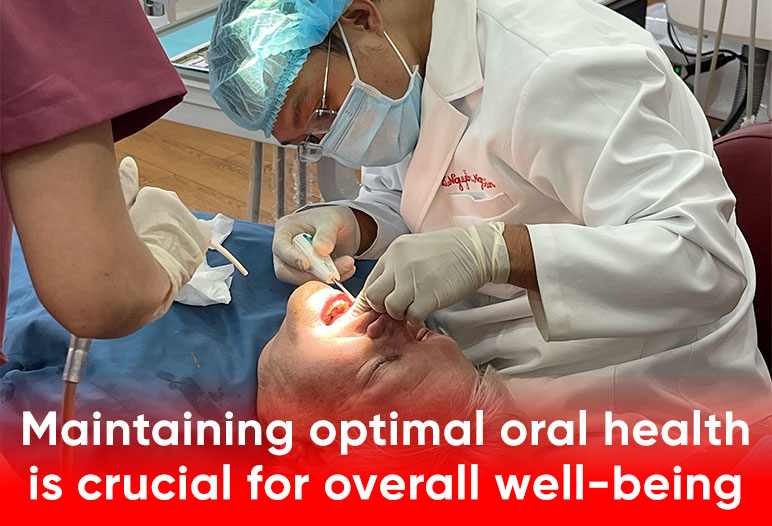When searching for a dentist near me, it’s essential to understand the broader implications of maintaining oral health. Regular dental visits are not merely about keeping your smile bright; they are an integral part of preventive healthcare that affects your overall well-being.
The importance of regular dental check-ups
Maintaining optimal oral health is crucial for overall well-being. Regular dental check-ups are not just about achieving and preserving a bright smile; they are a fundamental aspect of preventive healthcare. Neglecting dental care can lead to a cascade of problems, impacting not only your teeth and gums but also your overall health.
These regular check-ups typically involve a professional cleaning by a hygienist, a comprehensive examination by the dentist, and valuable advice on maintaining good oral hygiene habits at home. These visits help you understand key aspects of your oral health, providing a proactive approach to managing it.

Highlight the benefits of regular dental care
The benefits of regular dental care extend far beyond mere aesthetics. Here are some significant advantages:
- Early Detection and Prevention of Oral Diseases: One of the most critical benefits of regular check-ups is the ability of dentists to identify potential issues at their earliest stages. Conditions like cavities, gum disease, and even oral cancer can be detected early, vastly improving the chances of successful treatment.
- Maintaining Healthy Gums and Teeth: Regular professional cleanings help remove plaque and tartar buildup that cannot be eliminated with routine brushing and flossing. This preventative measure helps avoid gingivitis and periodontal disease, both of which can lead to tooth loss if left untreated.
- Preventing Tooth Decay: Consistent check-ups make it easier for dentists to identify cavities before they become large and require extensive treatment. Addressing these issues early makes restorative treatments less invasive and more effective.
Discuss potential oral health issues if neglected
Neglecting regular dental visits may seem harmless initially, but the consequences can snowball into serious health issues over time. Some of the critical issues include:
- Cavities and Tooth Decay: Poor oral hygiene fosters an environment where bacteria thrive, leading to the erosion of tooth enamel and subsequent cavities. If left untreated, these cavities can progress to infection, pain, and ultimately tooth loss.
- Gum Disease: The accumulation of plaque and tartar irritates the gums, leading to gingivitis, the early stage of gum disease. Untreated gingivitis can escalate to periodontitis, a severe infection that destroys bone and tissue supporting teeth.
- Tooth Loss: Gum disease and untreated cavities are the primary causes of tooth loss. Losing teeth can severely impact chewing, speaking, and overall self-esteem, affecting one’s social and physical well-being.
In conclusion, maintaining regular dental check-ups is vital not just for oral health but for overall well-being. Preventive care can save you from a host of more complex issues down the line.
How to find a dentist near me
Finding a qualified and trustworthy dentist can be a daunting task, but fortunately, many resources are available to assist in your search. Whether you’re looking for the nearest dentists to me or a specific type of dental service, understanding how to navigate your options is key.
Online dental directories
The internet has revolutionized the way people find services, including dental care. Several online dental directories provide comprehensive lists of dentists in your area, making it easier to search for what you need.
- Zocdoc: This platform allows you to filter searches based on location, insurance acceptance, and availability. It also features patient reviews and ratings, helping you make informed decisions.
- Find a Dentist: Hosted by the American Dental Association (ADA), this directory offers a list of licensed dentists in your area. ADA ensures that the dentists listed adhere to ethical and professional standards, giving you peace of mind.
- Google Maps: A simple Google search for “Dentist near me” will yield a map and list of dentists in your vicinity. This provides essential information such as contact details, operating hours, and reviews.
Utilizing these online tools can significantly simplify your search for a dental clinic nearest to you.
Dental insurance provider
If you have dental insurance, leveraging your provider can streamline the process of finding a dentist. Most insurance companies maintain a directory of in-network dentists, which you can easily access online or by calling customer service.
- Reduced Costs: Visiting an in-network dentist often leads to lower out-of-pocket expenses since your insurance may cover a larger portion of the service costs.
- Simplified Claims Processing: Claims for services rendered by in-network dentists are typically processed more efficiently.
- Pre-negotiated Rates: Insurance providers negotiate rates with these dentists, resulting in predictable and often lower costs for patients.
Word-of-Mouth recommendations
One of the best ways to find a trustworthy dentist is through recommendations from friends, family, and colleagues. Personal experiences can provide valuable insights into a dentist’s professionalism and patient care.
- Ask Questions: When gathering recommendations, inquire about the dental office’s atmosphere, staff friendliness, and the overall quality of care received.
- Trustworthy Sources: Friends and family usually provide candid feedback, allowing you to gauge a dentist’s reliability and skill.
In summary, utilizing online directories, dental insurance resources, and personal recommendations can effectively guide you in finding a dentist office near me.

What to look for in a dentist
Once you’ve compiled a list of potential dentists, you need to consider several factors when making your selection. Choosing the right dentist can greatly influence your overall experience and satisfaction with dental care.
Qualifications and Experience
Choosing a licensed and experienced dentist is paramount for ensuring quality care. Here’s what to keep in mind:
- Verify Licensing: Confirm that the dentist is licensed to practice in your state. You can usually verify this information on your state’s dental board website. This ensures that the dentist adheres to the required educational and ethical standards.
- Check Experience: Consider the dentist’s years of practice and any specialized training in particular areas of dentistry. While experience doesn’t always guarantee quality, it often indicates a higher level of expertise.
- Specialized Training: If you need specific dental services—like orthodontics or oral surgery—ensuring that the dentist has relevant specialized training can be beneficial.
Office location and hours
Practical considerations like office location and hours are essential when selecting a dentist.
- Convenience: Opt for a dentist whose office is conveniently located near your home or workplace to minimize travel time and make it easier to attend appointments.
- Office Hours: Review the dentist’s office hours to ensure they align with your schedule. Some dentists offer evening or weekend appointments, which can be advantageous for those with busy lives.
Patient reviews and testimonials
Online reviews and patient testimonials are invaluable in gauging a dentist’s reputation and patient satisfaction.
- Read Online Reviews: Pay attention to the volume and nature of feedback. Look for trends regarding communication skills, bedside manner, and the quality of care provided.
- Consider Overall Reputation: A dentist with consistently positive reviews likely provides a good patient experience, while consistently negative feedback could be a red flag.
- Look for Specific Details: In reviews, note comments about the office environment, quality of explanations given by the dentist, and whether patients felt heard and respected during their visits.
In conclusion, taking the time to research qualifications, office logistics, and patient reviews will help you select the right dentist for your needs.
Common dental procedures
Understanding common dental procedures can enhance your knowledge and ease any concerns you might have when visiting a dentist. Here are some prevalent procedures:
Routine dental check-ups and cleanings
Routine check-ups and cleanings form the foundation of preventive dentistry.
- Purpose: These visits typically include professional cleaning by a hygienist to eliminate plaque and tartar, an examination by the dentist to check for signs of decay or gum disease, and x-rays if necessary.
- Frequency: Dentists generally recommend biannual visits for most patients. However, individual oral health conditions may necessitate more frequent appointments.
Regularly scheduled check-ups not only help maintain your oral health but also foster a better relationship with your dental provider.

Dental fillings
Dental fillings repair teeth damaged by decay, restoring their structure and function.
- Purpose: Cavities create holes in the enamel and dentin of teeth, necessitating fillings to prevent further decay and discomfort.
- Materials: Fillings come in various materials, including amalgam (silver), composite resin (tooth-colored), gold, and ceramic. The choice of filling material may depend on factors like cavity location, personal preference, and the dentist’s recommendation.
Discussing filling options with your dentist will ensure you receive the best treatment tailored to your needs.
Root canals
Root canal treatment addresses infected or damaged tooth pulp, helping save the tooth.
- Procedure: During a root canal, the dentist removes the affected pulp, cleans the interior of the tooth, and fills it with a durable material to restore its function.
- Aftercare: Post-treatment, patients may experience some discomfort, but this subsides within a few days. Following proper aftercare instructions from your dentist is crucial to ensure recovery and prevent complications.
Understanding these common dental procedures can empower you to discuss your treatment options with your dentist and alleviate any uncertainties you may have.
Conclusion
Regular dental check-ups are vital for maintaining not just optimal oral health but also overall well-being. They allow for early detection and prevention of oral diseases, help maintain healthy gums and teeth, and reduce the risk of systemic diseases linked to poor oral hygiene.
Finding the right dentist near me involves leveraging available resources, considering qualifications, and evaluating patient reviews. Understanding common dental procedures enhances your preparedness for dental visits and helps establish better communication with your dental provider.
Ultimately, prioritizing your oral health through regular check-ups and choosing a suitable dentist can significantly improve your quality of life, enabling you to maintain a beautiful and confident smile.



SAIGON CENTER DENTAL CLINIC
Best dentist in Vietnam
Our English-speaking team specializes in dental implants, teeth whitening, veneers, fillings, root canals, and pediatric care,... Trusted by locals and expats alike, we are known for being one of the best dentists in Ho Chi Minh City. Book an appointment today!"
SAIGON CENTER DENTAL CLINIC
Best dentist in Vietnam
Our English-speaking team specializes in dental implants, teeth whitening, veneers, fillings, root canals, and pediatric care,... Trusted by locals and expats alike, we are known for being one of the best dentists in Ho Chi Minh City. Book an appointment today!"